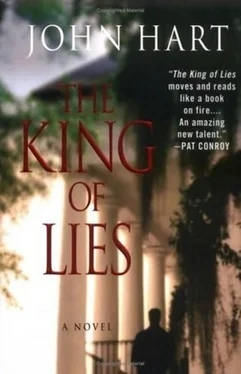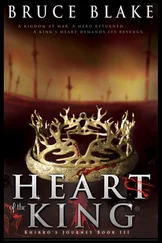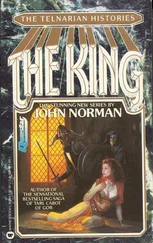“Save your fucking sympathy,” she said, and walked back to the house.
I let her go, and for that moment I seemed to float; but the absence of pain can pass as pleasure for only so long, and I still had things to do. I pointed her car toward the office.
A psychiatrist could probably explain my obsession with opening Ezra’s safe. In tearing down his last secret, I was replacing him, assuming his power. Or struggling to understand him. To outdo him. Truthfully, it was nothing that complicated. I’d worked in that building for ten years, thirteen if you counted the summer jobs during law school. During that time, my father had made no reference to the safe. We were family. We were partners. He shouldn’t have kept secrets from me. Yes, I was curious, but more than that I was disturbed; and some part of me believed that tearing down this secret would make my father known to me once and for all. Our truest self is often the person we allow no one else to see-who we are when we are alone. In the real world, we edit. We compromise and prevaricate.
I wanted to see the man behind the curtain.
For what I’d realized was this, and I should have seen it sooner: Ezra cared about having money; it was the curse of growing up dirt-poor. Money bought food. Money fixed the roof. Having it meant survival. So the million-dollar jury award that made him famous and ultimately rich was not the most important thing after all. I’d been wrong about that. Because big-dollar jury verdicts are appealed, and even if they’re not, nobody cuts a check the day of the verdict. Making money versus having money. In that equation, only one date matters: the day you deposit the check.
I didn’t know what date that was, but there would be records. Somewhere in the office was a deposit record showing a cash infusion of $333,333.33, exactly one-third of one million dollars. By the time he died, a few hundred grand amounted to chump change, but that was the money that had made him. I should have seen it.
I parked in back and looked up at the tall, narrow building. Already I felt like a stranger there, and Barbara’s words echoed in my mind: Ten years… wasted. Just gone.
I got out of the car. No one was around, but in the distance I heard sirens, and I thought of Mills. She was looking at Ezra’s gun, slapping her open palms against the hard muscles of her thighs. She would find the anonymous caller and I would be identified. I would be arrested, tried, and convicted. All I had was Hank, and the faded hope that Vanessa Stolen could save both body and soul.
Inside, the office was musty, as if weeks or months had passed since last I’d been there. Shadows stretched through slatted blinds, and dust hung in the alternating bars of light. The place was silent and unwelcoming, as if my thoughts had betrayed me. I did not belong. That was the message. The building knew.
I locked the door behind me, moved down the short hall and into the main reception area. Sound was muffled; I pushed through air that felt like water, and accepted that much of what I felt was formless dread. I tried to shake it off.
The cops had seized my computers, so I went down the narrow, creaking staircase to the basement, where boxes rose in jagged mounds and a single bare bulb dangled as if from a gibbet. The place was packed with old case files, tax records, and bank statements. I saw broken furniture, an exercise machine that dated to the seventies, and eight different golf bags. It was a mess, and the oldest stuff was in the very back. I waded through it, trying to figure out the system. The boxes were stacked haphazardly but were grouped together by dates. So the files from any given year would be found together, buried in a mass grave.
I located what I thought would be the right year and started tearing open boxes. There was no order to it at all, which surprised me. Ezra had always been meticulous in his affairs. Files numbered in the thousands, crushed into misshapen cardboard cartons. And inside the larger boxes I found smaller containers holding monthly calendars, receipts, message slips, dried-out pens, and paper clips. There were half-used legal pads and discarded Rolodex cards. It was as if Ezra had emptied his desk every year and then started fresh with new supplies. I opened his day planner for December, saw the small exclamation point he’d placed on December 31, and realized then why this was so different. It was a finished year, and like so much of his past, Ezra had boxed it away to be forgotten. Ezra had always cared about the future. Everything else was one step above refuse.
I found what I was looking for in the bottom of the seventh box, buried beneath a foot and a half of divorce pleadings. I recognized the well-creased spine of the thick black ledger book that Ezra had always preferred. It made a cracking sound when I opened it, and I fingered the green paper, now browned at the edges, and saw the rows of Ezra’s precise figures. My first impression was of smallness. Small writing and small numbers-nothing like his stature or the billings he would soon come to achieve. I found the deposit entry on the thirty-third page. The deposit above it was for fifty-seven dollars, the one below for an even hundred. His handwriting was unvaried, so that one-third of a million dollars might well have been a daily deposit. Looking at it, I could only imagine the satisfaction that entry must have given him. Yet, it was as if he’d bottled up any symptoms of joy or pleasure. Maybe he’d been selfish with it; maybe he’d just been disciplined. But I could still remember the night he took us out to celebrate. “Nothing can stop me now,” he’d said. And he’d been right, until Alex shot him in the head.
I left the basement and turned off the light. The smell of moldering cardboard followed me as I headed for Ezra’s office. I paused at the foot of the stairs, remembering the sound of a heavy chair crashing down; but now there was only silence, and so I broke it, my feet heavy on the time-worn stairs. The rug looked different; maybe it was the light, but it seemed to ripple at the far corner. I pulled it back, wondered again if my mind was playing tricks on me. The wood was chipped at the edge, gouged around the nail heads. The marks were unfamiliar, small, as if made by a flathead screwdriver. I ran my fingertips over them, wondering if someone else had been here.
I dismissed the thought. Time was not on my side, and I had a number burning holes in my brain. I grabbed the hammer and went to work on the nails. I tried to slip the claw beneath the heads. I gouged more wood, scratched the nail heads shiny, but could not get them out. I rammed the claw into the crack at the boards’ ends and leaned back on the handle. No give. I pulled harder, felt the tension in my back as I heaved. But the four big nails were too much.
I ran back to the basement, back into the weak light of that one dangling bulb, then around the cardboard junkyard to the tool corner, where I’d seen a snow shovel, a ladder, a busted rake, and an old car jack. I found the lug wrench that went with the jack; it was two feet long with a sharp, tapered end. Back upstairs, breathing hard, I pushed the narrow end between the boards, pounded the other end with the hammer. Steel slipped into the crack where that yellow-white wood seemed to smile at me. I jammed the hammer against the base of the wrench for leverage, held it there with my foot, and then I put one hundred and ninety pounds on that long wrench. I leaned into it, heard wood crack and then splinter. I shifted down the board. Pried up one ragged piece and then another, until the whole thing came loose. I ripped the boards out, felt splinters in my palm and ignored them. I threw the ruined boards aside.
The safe challenged me, and for a moment I was afraid; but I pictured my old man’s ledger entry, knew it was the right number. I was ready to tear him down, ready to know, so I dropped again to my knees. I knelt above this last piece of him, said a silent prayer, and typed in the date that he’d made the largest deposit of his life.
Читать дальше












